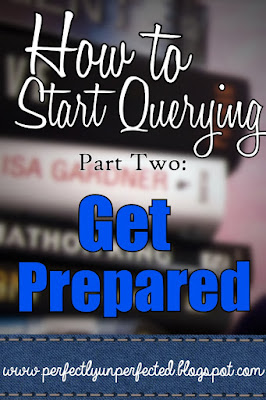How to Start Querying, Part Two: Get Prepared
On Tuesday, I gave you a bunch of tips on how to organize yourself before you start querying. Now it's time to get prepared!
1. Triple check your manuscript. Guys, when I say check your manuscript, I mean check it. Don't skim over it and assume every chapter is good. Really, honestly give your book one last good read-through before you decide to move on and query. I skipped this step and ended up definitely regretting it, so take it from me and triple check your manuscript!
2. Practice writing query letters. This is a good exercise to do, especially if you don't even know how to write a query letter. For all you newbies out there, a query is a letter you send to agents that gives an overview of your story's summary and includes any relevant information about you and your book. Queries are professional letters and should be taken seriously, but they shouldn't be so serious that you sound boring. That's the tricky part!
Here's your general query letter format:
1. Triple check your manuscript. Guys, when I say check your manuscript, I mean check it. Don't skim over it and assume every chapter is good. Really, honestly give your book one last good read-through before you decide to move on and query. I skipped this step and ended up definitely regretting it, so take it from me and triple check your manuscript!
2. Practice writing query letters. This is a good exercise to do, especially if you don't even know how to write a query letter. For all you newbies out there, a query is a letter you send to agents that gives an overview of your story's summary and includes any relevant information about you and your book. Queries are professional letters and should be taken seriously, but they shouldn't be so serious that you sound boring. That's the tricky part!
Here's your general query letter format:
1. Opening sentence/hook
2. Brief (1 paragraph) summary
3. Book title, genre, word count
4. Credentials/about you
5. Valediction (include your name, phone number, and email)
Some agents have specific standards on how they want their queries formatted, but we'll discuss that in a later post. For now, try writing a few practice queries with the goal of being concise. Agents love to see a good story summarized in a paragraph, and that is a very difficult thing to do! Take a look at two of my query letters below to use as a reference. The old one on the left is way too long, has too many paragraphs, and contains sooo much unnecessary information. It makes me cringe every time I read it! The more recent one on the right, though, is much more concise, well-formatted, and actually got me a request to see more. Even without enlarging the image, it's easy to see which letter has more of a professional look to it. Do some practice query writing and have your friends or family read it over to make sure everything sounds good. You won't regret it!
3. Practice writing a synopsis or synopsis outline. If you get a request from an agent to see more of your work, odds are he or she will ask for a full synopsis. Or, depending on the agent, he or she may want to see a synopsis when you send in your query. Either way, it's always good to plan ahead and have multiple synopses on hand. That's why it's good to practice writing them! Though they can be a little irritating to write, a synopsis is necessary in the publishing world. Outlining a synopsis is similar to outlining your novel. Take a look at your plot and pick out the things that are the most important (i.e., inciting incident, turning point, disaster, climax, etc.) You want to make sure you cover all the basics of your story, including the ending. Yes, you want spoilers! Don't leave anything out, but don't give too much information, either. Again--that's the tricky part! It's up to you to figure out what should be included and what shouldn't, but for all you newbies out there, here are some pointers. A guide, if you will.
1. Describe the beginning of your story. Introduce the main character.
2. Describe the inciting incident. What happens that starts your character's journey?
3. Rising action. What obstacles does your character face? What is their goal?
*Do not introduce every minor character. 1-3 character names in a synopsis is enough*
4. Is there a tragedy your character faces? How does that change them?
5. Turning point/Climax. Does your character's quest change? Is there an obstacle they must face in order to achieve their goal?
6. Falling action. Does your character achieve their goal? How?
7. Resolution. Happily ever after, or is a sequel necessary?
Most synopses are 1-2 pages and are written in present tense. Use active voice, double space, and though you want to reveal plot twists and the ending, don't give too much detail. Your synopsis is a preview of your writing, and should make the agent excited and eager to ask you for the entire manuscript. And don't forget, practice makes perfect!
Check back next week for part three, where I'll talk all about how and where to find agents and publishers!
"Do not fear, for I am with you; do not be dismayed, for I am your God; I will strengthen you, I will help you, I will uphold you with my righteous right hand." Isaiah 41:10

